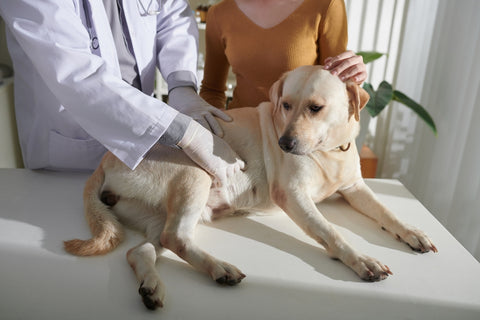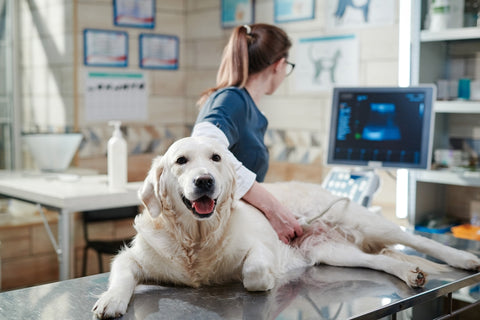Pancreatitis in Dogs: A Guide to Symptoms, Treatment, and Natural Support
Understanding Pancreatitis in Dogs
Pancreatitis, an inflammation of the pancreas, is a common and potentially serious health concern in dogs. The pancreas, an organ located behind the stomach, plays a crucial role in digestion by producing enzymes that break down food. When these enzymes become activated within the pancreas itself, inflammation ensues, leading to pancreatitis.
Types of Pancreatitis
Pancreatitis can be classified into two main types: acute and chronic. Acute pancreatitis is characterised by a sudden and severe onset, often accompanied by intense pain and digestive upset. Chronic pancreatitis, on the other hand, involves ongoing inflammation, often with periods of flare-ups. Chronic pancreatitis can lead to permanent damage to the pancreas and impaired digestive function.
Symptoms of Pancreatitis in Dogs
The symptoms of pancreatitis in dogs can vary depending on the severity of the condition. Some of the most common signs include:
- Abdominal pain: Dogs may exhibit signs of abdominal discomfort, such as a hunched back, reluctance to move, and vocalisations indicating pain.

- Loss of appetite: Appetite loss is a common symptom of pancreatitis, as the inflammation and pain can make eating unappealing.
- Lethargy: Dogs with pancreatitis may appear lethargic and have decreased energy levels due to discomfort and the body's efforts to heal.
- Vomiting: Vomiting is a frequent symptom of pancreatitis, as the inflamed pancreas can disrupt normal digestive processes.
- Diarrhoea: Diarrhoea can occur due to the pancreas's inability to properly digest food.
- Dehydration: Vomiting and diarrhoea can lead to dehydration, which can manifest as dry mouth, sunken eyes, and reduced urine output.
- Fever: Fever may be present if the inflammation is severe or if there is an underlying infection.
- Abdominal distention: In some cases, the abdomen may appear swollen or distended due to fluid accumulation or inflammation.
Diagnosing Pancreatitis in Dogs
Veterinarians typically diagnose pancreatitis based on a combination of clinical signs, physical examination findings, and laboratory tests. Blood tests can reveal elevated levels of pancreatic enzymes, while abdominal imaging, such as ultrasound, can help visualise the pancreas and assess its condition.

Treatment Options for Pancreatitis in Dogs
Treatment for pancreatitis in dogs will depend on the severity of the condition and the underlying cause. In some cases, hospitalisation may be required to provide supportive care, such as intravenous fluids, pain medication, and anti-nausea medications.
For less severe cases, treatment may be managed at home. This may involve withholding food for 24-48 hours to allow the pancreas to rest and heal, followed by a gradual reintroduction of a bland, low-fat diet. Additionally, medications may be prescribed to manage pain, nausea, and inflammation.
Natural Support for Dogs with Pancreatitis
Along with conventional treatment, incorporating natural supplements can provide additional support for dogs with pancreatitis. Some of the most beneficial supplements include:
- Turmeric: Turmeric supplement, a spice which supports the body’s natural anti-inflammation cycles, can help reduce inflammation in the pancreas and support overall digestive health.
- Probiotics: Probiotics, live bacteria that promote gut health, can help restore the balance of gut flora, improve nutrient absorption, and reduce the risk of diarrhoea.
- Digestive enzymes: Digestive enzymes can aid in breaking down food and improving digestion, particularly when the pancreas's enzyme production is impaired.

Dietary Recommendations for Dogs with Pancreatitis
Feeding a low-fat, easily digestible diet is crucial for dogs with pancreatitis. This type of diet reduces the pancreas's workload and promotes healing. Commercial diets specifically formulated for dogs with pancreatitis are available, or you can work with your veterinarian to create a homemade diet.
Preventing Pancreatitis in Dogs
While there is no definitive way to prevent pancreatitis, certain factors can increase the risk, such as obesity, high-fat diets, and certain medical conditions. Maintaining a healthy weight, feeding a balanced diet, and addressing underlying medical issues can help reduce the risk of pancreatitis in dogs.
Conclusion
Pancreatitis, though serious, can be effectively managed with early diagnosis, appropriate treatment, and a supportive home environment. Incorporating natural supplements, such as Turmeric for dogs, probiotics, and digestive enzymes, can further support the healing process and promote overall digestive health. Remember to consult your veterinarian for personalised guidance and treatment recommendations for your dog's specific needs.

